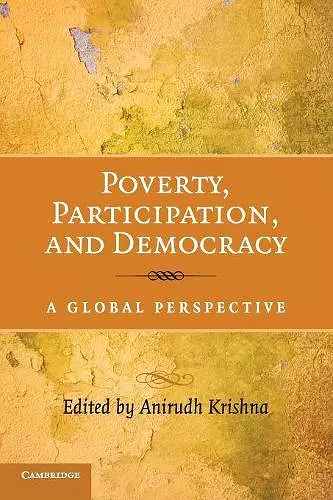Poverty, Participation, and Democracy
A Global Perspective
Format:Paperback
Publisher:Cambridge University Press
Published:21st Jul '08
Currently unavailable, and unfortunately no date known when it will be back
This paperback is available in another edition too:
- Hardback£78.00(9780521504454)

Evidence from 24 countries shows that political attitudes and participation levels are unaffected by relative wealth.
Evidence from 24 diverse countries of Asia, Africa and Latin America examined in this volume shows how poor people do not value democracy any less than their richer counterparts. Political attitudes and participation levels are unaffected by relative wealth. Education makes for more committed and engaged democratic citizens.For too long a conventional wisdom has held sway, suggesting that poor people in poor countries are not supportive of democracy and that democracies will be sustained only after a certain average level of wealth has been achieved. Evidence from 24 diverse countries of Asia, Africa and Latin America examined in this volume shows how poor people do not value democracy any less than their richer counterparts. Their faith in democracy is as high as that of other citizens, and they participate in democratic activities as much as their richer counterparts. Democracy is not likely to be unstable or unwelcome simply because poverty is widespread. Political attitudes and participation levels are unaffected by relative wealth. Education, rather than income or wealth, makes for more committed and engaged democratic citizens. Investments in education will make a critical difference for stabilizing and strengthening democracy.
'A significant and invigorating advance in our understanding of democracy's likely future in the developing world, with clear policy implications about how to support fragile democracies more effectively.' Thomas Carothers, Carnegie Endowment for International Peace
'This is a theoretically and politically important book, based on an impressive set of empirical evidence provided by leading survey researchers. The book subjects generalizations about differences between rich and poor people based on findings of studies of American political behavior to tests with data from more than 35,000 interviews in 24 countries in Africa, Asia, and Latin America. The test results prove these generalizations wrong; poor people in the developing world are not less supportive of democracy and less involved in democratic politics than their more affluent fellow citizens. Education is the crucial variable, and the spread of education to rural areas and poorer sectors of the population has considerably widened the support base for democracy. The authors are fully aware of potential problems with the depth of this support and with the institutional safeguards for the exercise of democratic rights by the poor, but they rightfully insist that observers and practitioners alike have to take seriously the overwhelming evidence of support for democracy among the world's poor.' Evelyn Huber, University of North Carolina, Chapel Hill
'This book offers an authoritative challenge to the prevailing belief that in the developing world, prosperous groups provide democracy with the greatest, most committed support. It is anchored in solid empirical evidence - which, unusually, comes from diverse regions of the world. Those concerned with democratic theory and development will find it impossible to ignore.' James Manor, University of London
'This important collection of papers on the political attitudes of the poor in the developing world significantly recasts the debate on the contemporary relationship between poverty and democracy. Not only does it offer powerful new empirical evidence from Africa, Latin America and South Asia to reject the conventional wisdoms of modernization theory that the poor do not make good democrats, the book's analysis of the data, attention to nuances and probing questions will fundamentally change how scholars think about these issues.' Nicolas Van de Walle, Cornell University
ISBN: 9780521729604
Dimensions: 228mm x 153mm x 14mm
Weight: 340g
208 pages